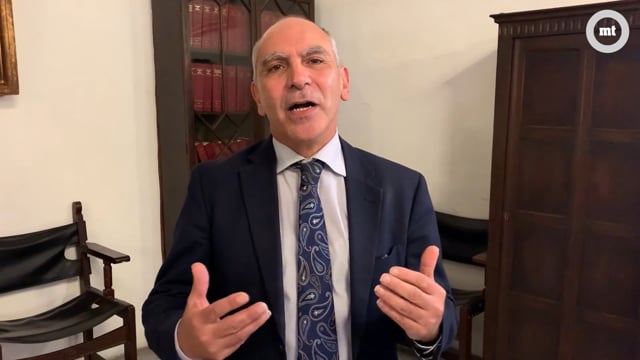[WATCH] Coronavirus no deadlier than influenza, Maltese health expert says
Coronavirus no deadlier than influenza, Mater Dei Hospital pathology department chairman Christopher Barbara says


The coronavirus flu hailing from China was no deadlier than the ordinary influenza, said Mater Dei Hospital’s clinical chairman of pathology, Christopher Barbara, in a press conference at the health ministry.
As more cases were identified in European countries this week, Barbara said the majority of persons who had died from the virus had been the elderly as well as persons with preexisting conditions.
The coronavirus, which has originated from Wuhan in China, is being dubbed the “cousin” of the SARS virus, which had spread in an earlier pandemic a decade ago. The virus appears to have originated from a Wuhan seafood market where wild animals, including marmots, birds, rabbits, bats and snakes, are traded illegally.
Coronaviruses are known to jump from animals to humans, so it’s thought that the first people infected with the disease – the group primarily made up of stallholders from the seafood market – contracted it from contact with animals.
Although an initial analysis of the virus suggested it was similar to coronavirus seen in snakes, it now seems more likely that it came from bats.
There have been so far 5,974 confirmed cases, and 9,239 suspected cases of the coronavirus. The death toll is currently 132 and there have been confirmed cases in 16 countries including German which saw the first human to human transmission.
Health Minister Chris Fearne said that 95% of persons who were infected have made a total recovery. However, he added that Malta was taking precautions to minimize the risk of the virus spreading if it were to reach the island.
“The health ministry is in partnership with Malta International Airport and has started screening passengers who have arrived in Malta from China, via connecting flights. These passengers are directed to the health clinic within the airport where they are asked a serious of questions and have their temperature taken – which may lead to swabbing for the virus if the doctor feels it is necessary.”
Fearne explained that the ministry has put procedures into place as a precaution which includes isolation units at Mater Dei Hospital within the infection disease unit; for cases where hospitalization is required, as well as off sight isolation areas for cases where hospitalization is not required.
“If need be we are also set up, to conduct contact tracing – which would be contacting any person the infected individual may have been in contact with who would be at serious risk. They will then be tested and isolated if need be,” Fearne said.
However, Fearne stressed that because of the coronavirus is new, information is fluid and could potentially change. “I just want to also assure the public that eating Chinese food is fine and that receiving packages from China, carries a very low risk, as the virus can only survive outside the host for 24 to 48 hours.”
How is the coronavirus transmitted?
Superintendent of Public Health Charmaine Gauci explained that the virus is transmitted through the air by coughing and sneezing. It is also transmitted through close personal contact such as shaking hands as well as touching an object or a surface which has been effected then touching the mouth, nose and eyes before washings one’s hands.
Gauci advised individuals travelling to avoid close contact with anyone who could potentially be carrying the virus, to wash hands regularly, avoid wet markets and unprotected contact with farm or wild animals and also for persons to practice cough etiquette.
However, as of yet a travel ban has not been put into place.


.png)



















